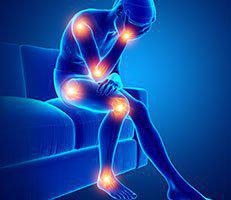Myalgia, which is another word for muscle pain.

Muscle Pain:
Myalgia, which is another word for muscle pain, can be caused by accidents, infections, or other health problems. It can be short-term or long-term, localized or spread out across the body, and the level of intensity changes from person to person.
Muscle pain is something that everyone can feel. Delayed-onset muscle soreness (DOMS) can happen to people who start a new exercise routine. It usually starts 6 to 12 hours after exercise and can last for up to 48 hours. You might feel pain during this time because your muscles are healing.
Signs and symptoms:
- Pain in the muscles
- Spasms in muscles
- Spasms in muscles
- Pain in the joints
What Causes
These are autoimmune diseases, like lupus, multiple sclerosis, and inclusion body myositis and polymyositis.
Colds, flu, malaria, trichinosis, Lyme disease, and Rocky Mountain spotted fever are all examples of infections. Infections with viruses and bacteria can make your muscles hurt and give you a fever, nausea, or swollen lymph nodes.
Back and abdominal strains, myofascial pain syndrome, tendinitis, and tendinosis are all problems that happen when you use your muscles too much. Statins (which lower cholesterol), ACE inhibitors (which treat high blood pressure), chemotherapy, and radiation are just a few of the medicines and treatments that can cause short-term and long-term muscle pain. The medicines might lead to myositis and set off pain sensors in muscles.
ALS, spinal muscular atrophy (SMA), myasthenia gravis (MG), Duchenne muscular dystrophy (DMD), and similar conditions affect the muscles and nerves. Stress, a lack of electrolytes, peripheral artery disease, hypothyroidism, fibromyalgia, compartment syndrome, chronic fatigue syndrome, sarcomas, and leukemia are some other health problems.
Muscle Pain Finding the cause:
If your doctor doesn’t know what’s causing your muscle pain or if it’s serious or lasts for a long time, they may order more tests.
Blood tests can help you find out how much of an enzyme, hormone, or electrolyte you have in your body and look for signs of diseases.
Muscle loss can be seen on a CT scan or an MRI.
Electromyography (EMG) is a way to check how well nerves and muscles are working by measuring the electrical activity in them.
Biopsy on muscle.
These extra tests can help your doctor figure out what’s wrong and how to treat it.
How to Treat:
Most of the time, sitting, stretching, or taking painkillers can help with short-term muscle pain.
Pain O Soma 500Mg is a prescription medicine that treats muscle pain in the most effective manner. It’s also offers quick relief from any discomfort which is caused by the muscle contractions. It provides relief from acute painful muscle to the adults. It also treats skeletal condition in the adults. The medicine should be taken only by a Doctor’s advise.
To ease the pain, rest the area and raise it up.
Use a cold compress to reduce swelling and a hot compress to help the muscles get more blood flow.
Soak in a warm bath or shower to ease your muscles.
Aspirin, acetaminophen, ibuprofen, and naproxen are pain killers that can help lower pain and swelling.
For extra help and relaxation, try complementary treatments like massage, acupuncture, and meditation.
These treatments can help you deal with short-term muscle pain and get better faster. If the pain doesn’t go away or gets worse, you should see a doctor to get a more thorough evaluation and a proper treatment plan.
For muscle tension, magnesium is very important for relaxing muscles and making them work properly. If you don’t get enough, your muscles and joints can twitch, feel tight, and be tense. Our expert guide shows how magnesium helps muscles heal and eases stress in muscles.
For muscle health, why take magnesium?
Magnesium helps with muscle pain, cramps, and recovery. This is because the element is important for keeping muscles healthy. Minerals like magnesium and other important types of minerals help keep muscles open and flexible.
Relaxing your muscles while you work out—Magnesium controls how much your muscles contract and rest when you work out or do some other kind of physical activity. It keeps lactic acid from building up, which can make muscles tense. After that, your muscles can get the air they need. Taking magnesium tablets can help with this because they relax your muscles.
Helps your muscles heal from exercise:
When you work out, your muscles get little tears and damage. To fix these, your body needs proteins, carbs, and other nutrients. Getting enough sleep, stretching, and magnesium can all help your body recover faster after exercise.
Energy production:
Getting enough magnesium is important because it helps your body make energy on its own. Many of your energy needs are met by adenosine triphosphate (ATP). This is a molecule that turns the energy in food into fuel. This fuel is then used by the body for other things, like muscle activity.
For muscle cramps, magnesium helps your body make growth factors, which help your body grow. These are proteins that help muscles get bigger and stronger over time.
If you don’t get enough magnesium, you’re more likely to:
- Having spasms (mostly in your legs or feet)
- Being tight
- Pains Weakness
- Feeling tired
What makes muscles tense?
Tension is very common and can happen almost anywhere in the body because there is so much muscle tissue. Most of the time, it’s caused by overworking or overusing a muscle while exercising or doing hard work.
Tense neck muscles are usually caused by strains from working out, lifting big things, or sitting, standing, or sleeping in an awkward position.
A lot of people have back strain, which can affect bones and joints as well as muscles and soft tissue. It could be a dull ache that won’t go away or a fast, sharp pain. To help support these parts of your body, you might want to take joint health supplements or bone supplements.
Some people may not get enough of certain vitamins or minerals, especially magnesium, if their muscles spasm or twitch after working out or standing for a long time.








